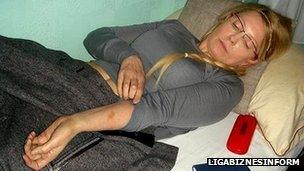UK ministers 'may boycott' Euro 2012 games in Ukraine
- Published

Western states believe the trial of Ms Tymoshenko was politically motivated
UK ministers may boycott Euro 2012 games in Ukraine in protest at the treatment of imprisoned former PM Yulia Tymoshenko, the foreign secretary says.
William Hague told the BBC the situation was "under review" after European leaders and EU Commission president Jose Manuel Barroso said they would not attend matches in Ukraine.
England are due to play all three of their group matches there.
Ms Tymoshenko is serving a seven-year jail sentence for abuse of office.
Her trial in October was condemned by Western states as politically motivated and last week photos emerged of alleged injuries Ms Tymoshenko said she received while in prison.
Mr Hague has said there is a "political problem" in Ukraine.
He told the BBC that he was disturbed by developments in the country, but welcomed the launching of an investigation by Ukraine's parliament into Ms Tymoshenko's treatment.
Politicians boycott
British Foreign Secretary William Hague: "We are disturbed about some of the trials that have taken place"
Mr Hague said the government was monitoring the situation, and would come to a decision on whether ministers would attend Euro 2012.
Ms Tymoshenko, who accuses President Viktor Yanukovych, a political rival, of seeking revenge, is said to have spent a week on hunger strike.
So far, European politicians who have announced that they will boycott the championships in Ukraine include German president Joachim Gauck and Austrian chancellor Werner Faymann, as well as Mr Barroso.
Part of the football tournament is also being held in Poland, but all England's group games are in Ukraine and Mr Robertson had intended to go to at least one of them.
The Football Association said that whether the minister went to the championships was a decision for him to make, while it would be guided by the tournament's organiser, Uefa.
Back pain
The pictures show Ms Tymoshenko, 51, displaying what appear to be bruises and grazes on the skin of her stomach and her arm, which are claimed to have happened as she was transferred to hospital.
Earlier this month, she was granted permission to leave her prison in the eastern city of Kharkiv to receive treatment in a hospital.
But the authorities denied her request to be treated abroad. She is said to have been suffering months of back pain and is reported to have been diagnosed with a herniated spinal disc.
German doctors who have examined her urged the Ukrainian government on Friday to allow her to be cared for abroad on "humanitarian grounds".
- Published2 May 2012
- Published26 April 2012
- Published28 April 2012